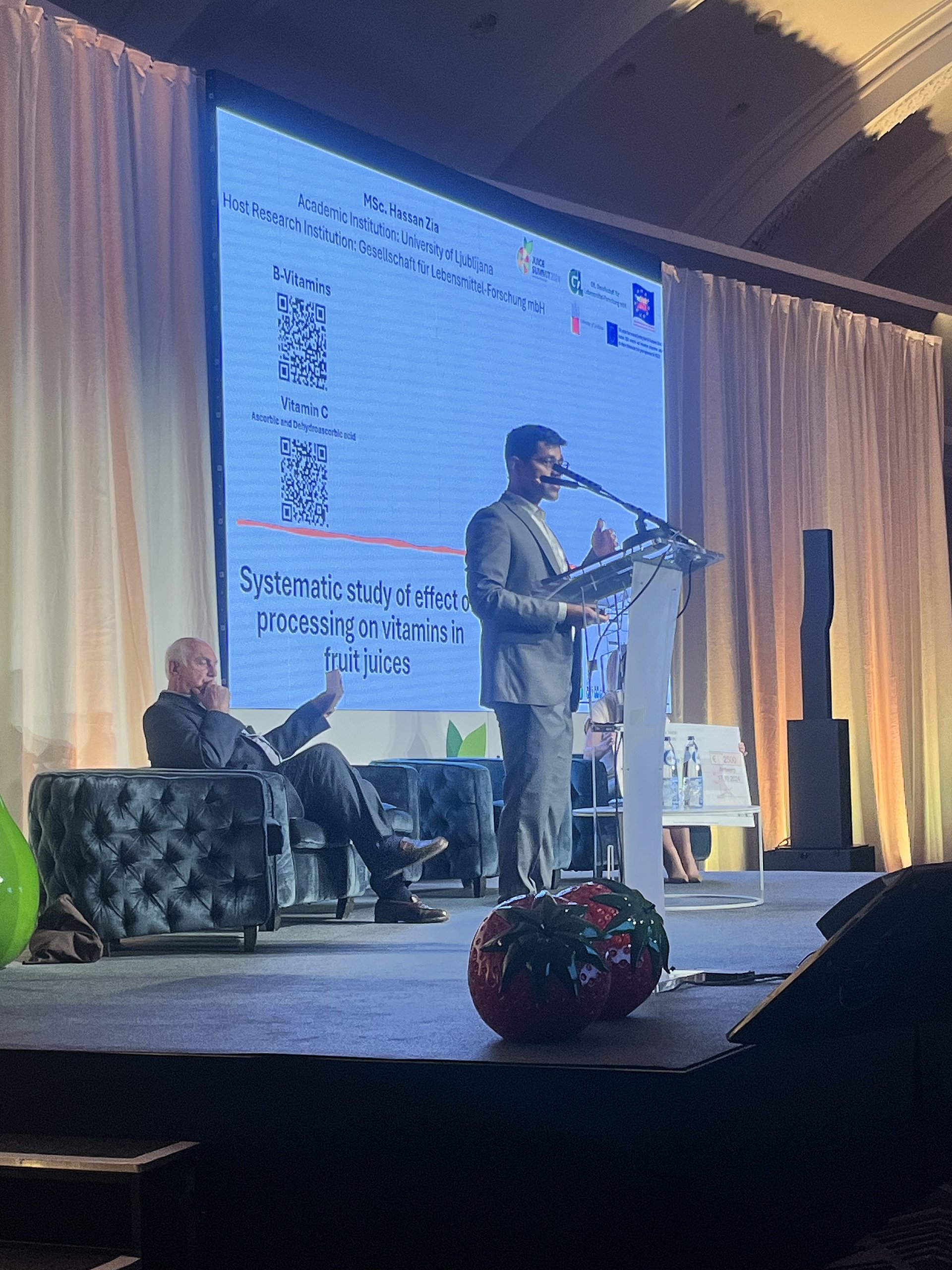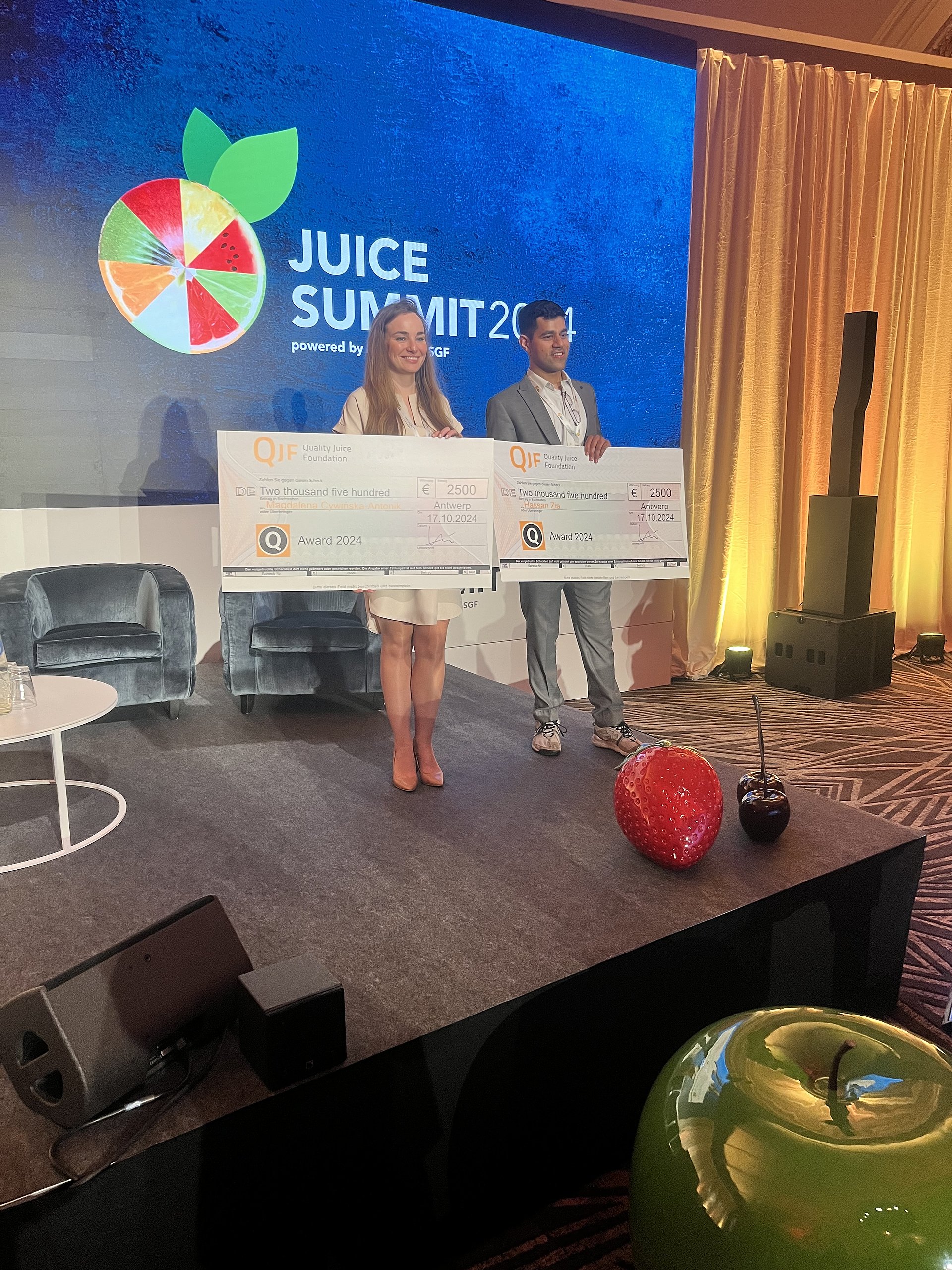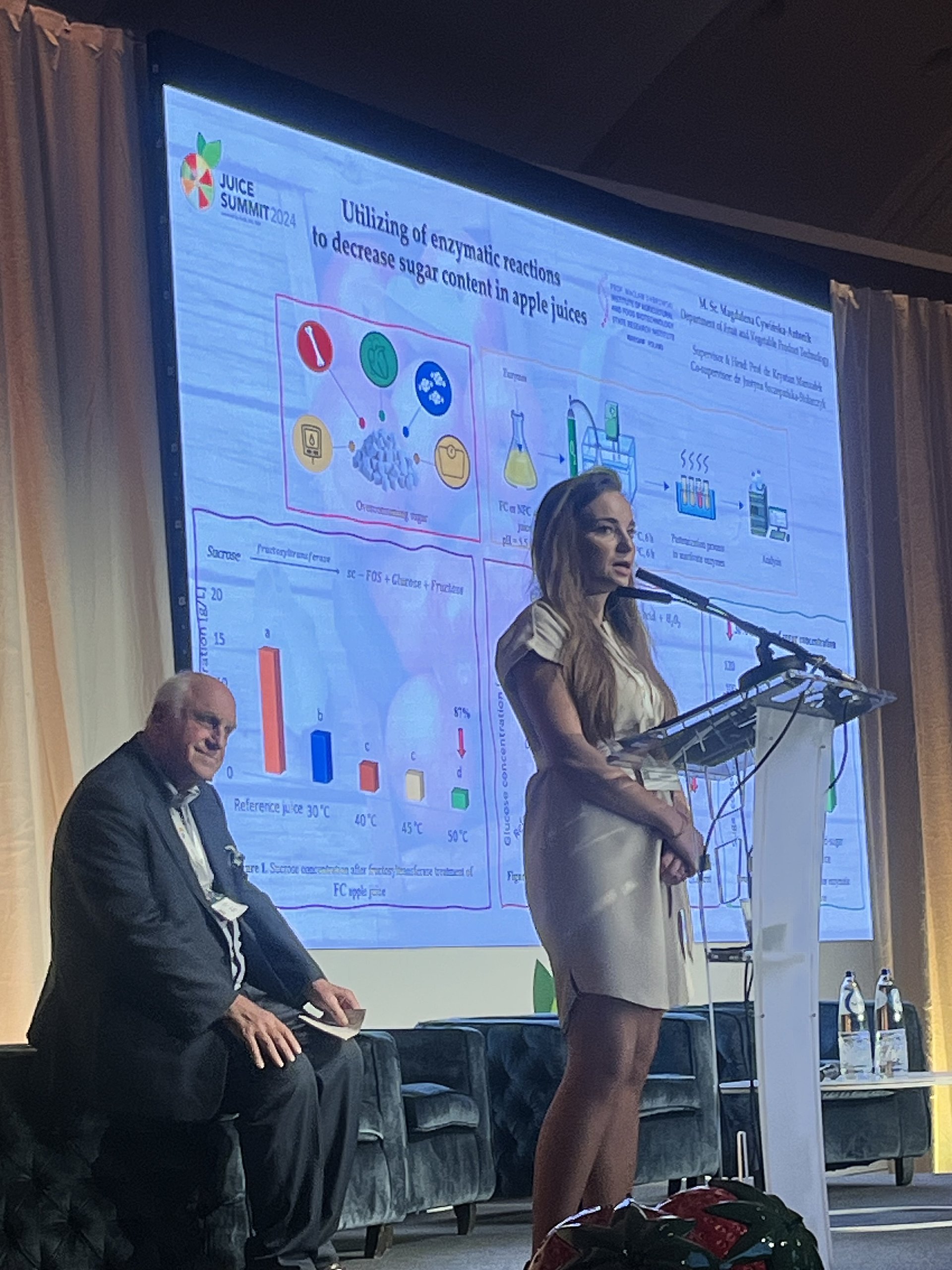Quality Juice Award
2025
Apply for the Quality Juice Award 2025 now!
Statutory task of the Quality Juice Foundation is to foster – through active and financial support – initiatives, measures and projects for the purpose of the foundation, especially those that aim at the improvement of quality and safety or of the image of fruit juices and fruit juice containing drinks.
As a special instrument, the QJF annually confers the “Quality Juice Award” that honors special merits in the area of legal, analytical and technological research work and practical further development of the positive and healthy image of fruit juices. The prize money amounts to 2,500 EUR.
If you are about to publish or have recently published a fruit juice related scientific paper or thesis regarding the improvement of quality, safety and image of fruit juices, we invite you to send us your application in English by 30 June 2025 to info(at)qualityjuice.org.
The application should contain:
- Cover letter with applicant’s contact information
- Short summary of your research work (1–2 pages DIN A4)
- Curriculum Vitae
- Recommendation letter written by the applicant’s supervisor
Eligibility:
- Active and full time student (Ph.D. or M.Sc.) or Postdoc
- Fluent in English (presentation will be held in English)
Evaluation criteria:
- Application completeness
- Student’s eligibility for QJF awards
- Relevance of research project to the QJF award program
- Innovative nature of the research work
Questions regarding the application process should be directed to info(at)qualityjuice.org.
The 2024 Quality Juice Award was presented by the President of the QJF, Carlos Abboud, to Magdalena Cywińska-Antonik from Poland and Hassan Zia from Pakistan at the Juice Summit in Antwerp on 17 October.
This year, for the first time, two winners were chosen due to the excellent quality of their research. Magdalena impressed the jury with her work on reducing sugar in juices using enzymes and Hassan with his development of new analytical methods for determining water-soluble vitamins.
Both were invited to present their research findings to an international audience of experts at the Juice Summit and received a symbolic cheque for the prize money of €2,500.
A summary of the two studies was presented on a poster each at the SGF stand at the Juice Summit. The posters are available for download here:
The 2023 Quality Juice Award was presented by Dr Joachim Tretzel, Vice-Chairman of the QJF, to M. Sc. Annette Wagner of Geisenheim University, Germany, during the Innovation in Technology session at the Juice Summit in Antwerp on 5 October.
In her thesis, supervised by Prof. Dr. Ralf Schweiggert, she is investigating the processing of fruit juices and purees under oxygen exclusion using a spiral filter press, focusing on blackcurrants and red-fleshed apples.
The results were particularly promising for apples, where the fresh juice produced by the spiral filter press contained six times more anthocyanins than the juice produced by the decanter. Significantly higher levels of ascorbic acid, colourless (poly)phenols and antioxidant capacity were also found.
Her findings are summarised in her poster, which she presented at the SGF's Juice Summit stand.
The QJF Award includes prize money of 2500 € and a free ticket to the Juice Summit.
The seventh edition of the Quality Juice Award was bestowed by Carlos Abboud, President of the Quality Juice Foundation, to Dr Carolien Buvé from the Universit of Leuven in Belgium during the gala dinner of the Juice Summit in Antwerp.
In her research, she studied the quality changes of shelf-stable strawberry juice during storage. Her integrated, science-based approach is of great value to the fruit juice industry, as it allows
- to obtain a multi-perspective view on quality changes during storage,
- to monitor multiple food quality attributes simultaneously (e.g. by an untargeted GC-MS fingerprinting analysis of the volatile fraction),
- to integrate instrumental and sensorial/consumer analyses to gain in depth insight into quality changes and
- to gain faster insight into quality changes by the application of accelerated shelf-life testing.
Moreover, the integrated approach which was applied in her study can easily be transferred to other fruit matrices (and food products in general) and can be used as a basis in other research areas.
Her results are summarized in her poster.
The QJF Award includes prize money of 2500 € and a free ticket to the Juice Summit.
The sixth edition of the Quality Juice Award was bestowed by Carlos Abboud, President of the Quality Juice Foundation, to Dr Matthew Pontifex from the Faculty of Medicine and Health Sciences at the University of East Anglia in Norwich, UK.
The research work on the effect of citrus polyphenols on brain health and diseases, in which Dr Pontifex was significantly involved, convinced the jury due to its excellent scientific quality as well as its relevance to the Quality Juice Award programme.
A summary of the research was published on the open online platform Frontiers in Neuroscience on 19 February 2021 https://doi.org/10.3389/fnins.2021.640648 and Dr Pontifex
presented the main results at the online General Assembly of SGF International e.V. on 21 October 2021 to an international audience of the Fruit Juice Industry.
Dr. Pontifex pointed out that despite some significant research gaps highlighted by the study the research team remains optimistic in regard to the brain health promoting influence of citrus polyphenols given the accumulating in vitro, preclinical and steadily emerging human evidence supporting the concept. Therefore, on the basis of this evidence, citrus fruits both as whole fruit and 100% juices should be encouraged within the diet for their potential neurological benefit.
Due to the Covid-19 pandemie, the QJF Board has decided to suspend the QJF Award for young scientists from the fruit juice industry for 2020. This decision was also made due to the postponement of the Juice Summit, which we believe provides the ideal setting for the award ceremony and gives the award winners the opportunity to present their research work to a broad professional audience.
For the 5th time now the Quality Juice Award, the prize for a research project on fruit juice of the Quality Juice Foundation, has been bestowed.
This year’s winner, Kathrin Vollmer from the University of Hohenheim in Stuttgart, received the symbolic cheque with the prize money of EUR 2,500 on 1 October at the international fruit juice conference Juice Summit and presented the results of her doctoral thesis entitled “Nonthermal processing of pineapple (Ananas comosus [L.] Merr.) juice”.
In her thesis, she has investigated the efficacy of two innovative and highly promising non-thermal technologies for the processing of pineapple juice: pressure change technology and pulsed light technology. The conducted research work provides valuable and comprehensive insights into the effects of both technologies on the juice quality.
As a result, she stated that both technologies demonstrated to be reasonable and persuasive alternatives for the production of natural fresh-like juices with extended shelf life and superior quality. Her findings are of high relevance for the fruit juice industry as they may help to optimise the fruit processing performances.
In vitro evaluation of the anti-lipogenic and anti-inflammatory potential of biotransformed extract from citrus residues
Assessment of functional beverages consumption among elite triathletes: oxidative stress, vascular biomarkers, inflammation, mutagenesis and degeneration of the nervous system
On 4 October, the Quality Juice Foundation presented the Quality Juice Award which is endowed with 2,500 € for the third time during the Technical Stream at the Juice Summit 2017 in Antwerp (Belgium). Carlos Abboud from Newbell Trade (Uruguay), President of the Quality Juice Foundation, presented the prize for 2017 to Libia Alejandra García Flores from the C.E.B.A.S.-C.S.I.C. Food Sci. & Technol. Dept. in Murcia, Spain, for her outstanding thesis on the “Assessment of functional beverages consumption among elite triathletes: oxidative stress, vascular biomarkers, inflammation, mutagenesis and degeneration of the nervous system”.
In the course of her thesis, Ms García Flores showed that functional fruit juices with their high levels of polyphenols can be proven to have a positive effect on the organism.
She examined the influence of citrus aronia juice for its effects on 16 elite triathletes over a training period of 145 days. For 45 days during this period, their diet was supplemented with the daily addition of 200 ml of a fruit juice mixture consisting of 95 % citrus and 5 % aronia juice.
65 biomarkers were measured in urine and 7 markers in blood plasma. These metabolic attributes correlate with inflammation-markers induced by oxidative stress. For the first time, analytical proof was obtained that oxidative stress is reduced by sports training in combination with consumption of citrus/aronia juice, resulting in an improvement in health. These are most encouraging results for the fruit juice industry.
Bioavailability of ß-cryptoxanthin is greater from pasteurized orange juice than from fresh oranges – a randomized cross-over study
The Quality Juice Foundation (QJF) is also fund-raising and supporting with own funds the activities in the previously mentioned fields. In this context, the QJF contributes with the scientific community which has a key position in the overall development of the society in the XXI century. The QJF supports the science and technology applied to the fruit sector but also aims to boost, in particular, the work of young scientists, by rewarding the best research in this field.
The Quality Juice Foundation’s president, Mr. Carlos Abboud, presented the prize for 2015 which was awarded to Julian Aschoff, from the University of Hohenheim, in Germany, for his research on bioavailability on carotenoids in pasteurized orange juices, published in the Molecular Nutrition & Food Research Journal with the title: “Bioavailability of ß-cryptoxanthin is greater from pasteurized orange juice than from fresh oranges – a randomized cross-over study”.
In his study he appoints to the question of the overall nutritional value of orange juice due to its high intrinsic sugar levels and the higher risk of type 2 diabetes associated to excessive consumption of fruit juices. Despite these findings, he mentions that there are several health benefits in the consumption of orange juice: for example the readily accessible vitamin C which is linked to up to 15 health claims, such as reduction of total cholesterol levels and the improvement of the vascular function.
Active compounds responsible for these effects are the carotenoids. Beta-cryptoxanthin constitutes a major carotenoid in oranges. Through a clinical study, the bioavailability of beta criptoxanthin was compared in a group of healthy volunteers who consumed the same amount of beta-criptoxantin as fruit (fresh orange) or as juice. The blood of the volunteers was analysed and showed that the amount of beta-criptoxantin after consumption of orange juice was significantly higher than that after consumption of orange juice. The results of the in vitro digestion of the fruit and the orange also demonstrated a higher bio-accessibility in orange juice compared to orange fruits, probably due to the juice processing.
In his discussion he indicates that the greatest increase in carotenoid bio-accessibility was observed during juice extraction. Finishing and thermal pasteurization of the fresh juice further increased carotenoid bio-accessibility in 40% as compared to fresh juice. These findings indicate the reduction of dietary fibres during the processing to be the most important step for improving carotenoid bioavailability in orange juice.
Transferring the results to an exemplary diet, the consumption of one glass (200 mL) of bottled orange juice would even provide 3 times more beta-cryptoxanthin than one serving of fresh navel orange. Very encouraging results for the fruit juice industry.
The foundation pursues its statutory objectives in particular by organising, holding and funding conferences and suitable training events for quality managers in the fruit juice industry, consumers and the trade press, by funding public and private projects and measures in accordance with the foundation's purpose, by supporting research projects for improving quality assurance instruments together with the development and testing of suitable technologies, and by endowing and presenting a prize to those who have provided particular services to nonfermenting fruit processing.
This prize – the QJF Quality Juice Award – was presented for the first time in October 2014 during the SGF General Assembly in Antwerp. The prize aims to honour outstanding achievements in the field of legal, analytical and technological research and practical further development of the positive, healthy image of fruit juice, and to promote such activities by providing financial support.
The first Quality Juice Award was won by Ms Scheling Wibowo from Indonesia. Carlos Abboud, President of the QJF, presented her with the prize of €2,500 for her research paper entitled “Colour and carotenoid changes of pasteurized orange juice during storage”. The paper was supervised by Prof. Dr. Hendrickx at the University of Leuven in Belgium, with extracts published in the “Food Chemistry” journal.




















